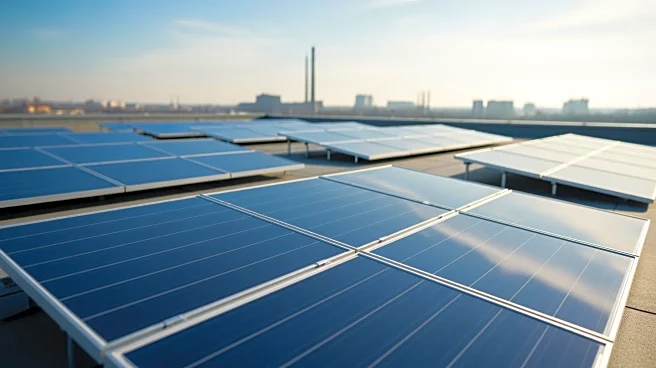What's Happening?
Pakistan is set to experience a significant shift in its energy landscape as rooftop solar generation is projected to exceed grid demand during daytime hours in major industrial regions next year. This
development is driven by a record increase in solar panel installations, which has led to lower emissions and reduced power bills. However, it has also disrupted the financial stability of utilities due to decreased demand for grid-based electricity. Aisha Moriani, Secretary of Pakistan's Climate Change Ministry, highlighted that cities like Lahore, Faisalabad, and Sialkot, known for high solar penetration, will witness 'negative demand' where solar generation offsets grid consumption entirely. This trend is expected to become more frequent during bright summer afternoons and industrial holidays.
Why It's Important?
The shift towards solar energy in Pakistan represents a major milestone for emerging markets, showcasing the potential for renewable energy to significantly alter traditional power dynamics. This change could lead to economic benefits such as reduced energy costs for consumers and decreased reliance on imported fuels. However, it also poses challenges for the country's utilities, which must adapt to declining grid demand and evolving market designs. The government plans to introduce new tariffs and fee structures to ensure equitable cost-sharing among solar users. Additionally, Pakistan's move to renegotiate LNG contracts with suppliers like Qatar reflects a strategic effort to align its energy import strategy with fiscal realities and demand patterns.
What's Next?
Pakistan's energy sector is poised for further transformation as the government seeks to balance the growth of renewable energy with the stability of its grid infrastructure. The introduction of new tariffs for large solar users and adjustments to fee structures are anticipated to address the financial impacts on utilities. Moreover, Pakistan's negotiations with LNG suppliers aim to secure more favorable terms that align with its evolving energy landscape. As solar adoption continues to rise, the country will need to focus on regulatory and market design advancements to accommodate the increasing share of renewable energy.
Beyond the Headlines
The rapid adoption of solar energy in Pakistan highlights broader implications for global energy markets, particularly in emerging economies. It underscores the potential for renewable energy to drive significant environmental and economic benefits while challenging traditional energy models. The shift also raises questions about the future of energy policy and infrastructure development, as countries must navigate the complexities of integrating renewable sources into existing systems. Pakistan's experience may serve as a case study for other nations seeking to transition towards sustainable energy solutions.









